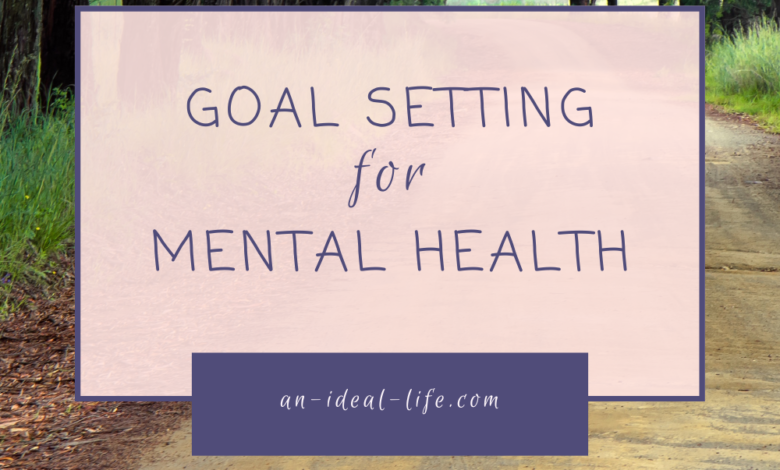Goal Setting for Mental Health

In our quest for an ideal life, it’s easy to overlook a simple yet profound tool: goal setting for mental health. It’s no secret that mental health plays a crucial role in our overall well-being. Whether you’re navigating daily challenges or crafting a life of fulfillment, understanding the role of your goals can be transformative.
*This post may include affiliate or referral links. At no extra cost to you (and with a special reader discount, in some cases!), I’ll receive a small commission or other rewards to help support An Ideal Life. As an Amazon Associate, I earn from qualifying purchases*
The information in this blog post is provided for educational and informational purposes only and should not be construed as medical advice. The content is not intended to be a substitute for professional medical advice, diagnosis, or treatment. Always seek the advice of your physician or other qualified healthcare provider with any questions you may have regarding a medical condition. Never disregard professional medical advice or delay seeking it because of something you have read online. The author of this post is not a licensed medical professional and does not assume any liability for any actions taken based on the information contained in this post.
The Science Behind Goal Setting for Mental Health
Setting goals isn’t just about achieving specific outcomes; it’s a fundamental tool for mental health. Did you know that the act of setting goals can activate the reward centers in our brains? This process releases dopamine, a neurotransmitter associated with feelings of pleasure and motivation. This research shows that goal setting can lead to increased motivation, a sense of accomplishment, and even improved mental health outcomes. By setting achievable goals, we give our days purpose and direction, which is crucial for mental clarity and emotional stability.
Types of Goals to Enhance Mental Health
- Self-Care Goals: Prioritize your well-being with activities like meditation, exercise, or a relaxing hobby.
- Professional Development Goals: Aim for a balanced approach to career growth that fosters a sense of achievement without burnout. This might involve seeking flexible work arrangements or pursuing passion projects that align with your energy levels and interests.
- Social Goals: Nurture relationships that are supportive and enriching, promoting a sense of belonging and community.
- Mindful Goals: Integrate mindfulness practices into your routine. This could be a daily meditation (such as with our Breathe and Be audio) or simply spending a few moments in nature, grounding yourself in the present.
- Creative Goals: Engage in creative activities like writing, various types of art, or coloring. These hobbies can act as pathways to expressing emotions and reducing stress.

Setting SMART Goals
The SMART framework (Specific, Measurable, Achievable, Relevant, Time-bound) is particularly effective for mental health, as well as for those of us managing fluctuating energy levels and focus. This method ensures your goals are clear and attainable, reducing anxiety and increasing the likelihood of success without overextending yourself.
Embracing Incremental Progress
Remember, the journey of a thousand miles begins with a single step. Small steps can lead to significant changes! Set small, manageable goals that lead to larger objectives, breaking down your goals into manageable tasks to avoid feeling overwhelmed. This gradual approach is less overwhelming and more conducive to sustaining mental health, even on days when your “spoons” may be limited.
What is the spoon theory, anyway?
Harnessing Technology and Tools
Consider exploring apps and digital tools designed to aid in goal setting and tracking. For example, a task management app like Trello or Todoist can help you organize your goals and break them down into smaller, more manageable tasks. Right now, I’m using a combination of the Finch app, Notion, and GoodNotes to manage my own goals! You can also utilize smartphone or Alexa reminders or alarms to maintain consistency (check out all our favorite Alexa skills, too!).
Reflecting on Goal Setting
Amidst the unpredictable nature of spoonie life, regularly revisiting and reflecting on your goals is key. This practice helps in understanding what’s working, what’s not, and what adjustments are needed to keep moving forward in a healthy, balanced way. Adaptability is crucial to maintaining mental resilience and promoting general wellness.
Navigating Setbacks
It’s equally important to understand that setbacks are a natural part of life, especially when juggling the various aspects of health and personal development. Approach these moments with self-compassion, and try to view them as opportunities for growth and learning. Accept that some days will be more productive than others and adapt your goals to accommodate these changes.
Curating a Supportive Community
To hold yourself accountable, consider joining online communities that share similar goals or challenges (like the AIL Collective, for instance?). These platforms can offer support, advice, and a sense of belonging. Alternatively, you could pair up with a friend or family member who cna help keep you accountable with regular check-ins.
Leveraging Supportive Practices
To boost the process of goal setting for mental health, consider adding on additional practices, like a vision board or gratitude journal. Crafting a vision board (or even a digital vision board) to give life to your aspirations, making them more tangible and compelling. A constant visual reminder will keep you connected to your goals.
At the same time, regularly practicing gratitude (like in our 30 Days of Gratitude or 365 Days of Gratitude journals) can shift your focus and foster a positive mindset. This shift is crucial for mental health, especially when navigating challenges along your journey. Over time, you might start to notice patterns in your entries, revealing deeper insights into your values and aspirations.
Positive affirmations are yet another tool that can reinforce your goal setting efforts and boost self-esteem along the way. Crafting unique affirmations or downloading our printable affirmation cards can be an easy way to incorporate this practice into your daily routines.
Practicing Self-Care
As always, it’s important to balance your goals with regular self-care practices. Integrating your favorite self-care rituals into the goal setting process can help prevent burnout and further benefit your mental health. This might include committing to a weekly yoga session, scheduling regular digital detoxes, or looking into therapy options.
Incorporating goal setting for mental health into our lives offers a powerful way to promote wellness. It empowers us to navigate these complexities with greater purpose and agency.
How do you approach goal setting for mental health? What strategies have you found to be helpful in maintaining wellness? Share your experiences in the comments below!
Source link




